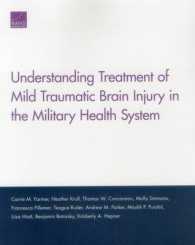- ホーム
- > 洋書
- > 英文書
- > Science / Mathematics
Full Description
This book addresses the profound changes facing the construction sector to provide a comprehensive and forward-looking exploration of how renewable energy systems and intelligent technologies are reshaping the construction industry towards a more sustainable, resilient, and cost-effective future.
The authors begin by examining the global development of solar, wind, and hydropower systems, emphasizing their potential to decarbonize the built environment when effectively integrated into building and infrastructure design. The discussion extends to the role of construction practices in advancing sustainability, showcasing real-world projects such as net-zero and energy-positive buildings that exemplify the application of renewable technologies in modern construction. The book explores the impact of Industry 4.0 and Construction 5.0, presenting how digital tools such as artificial intelligence, IoT, robotics, blockchain, and big data are transforming design processes, site operations, energy management, and performance monitoring. It also addresses how automation and human-robot collaboration are redefining productivity, safety, and workforce dynamics in construction. Central to the book is the integration of building information modelling as a collaborative platform for planning, simulating, and managing renewable energy facilities. It further introduces Life Cycle Cost Analysis as a critical decision-making framework, linking economic viability with environmental performance across a project's lifespan. The research-informed analysis and practical case examples provided throughout allow readers to implement intelligent and low-carbon solutions in the built environment.
As this book provides valuable insights on technical, financial, and energy resource issues, it is an invaluable resource for researchers and anyone in the construction industry who is seeking to improve sustainability, productivity, and efficiency in their projects. It is especially beneficial for architects and designers, engineers, project managers, construction managers, and contractors, among others.
Contents
1. Introduction to Renewable Energy 2. Renewable Energy in the Construction Industry 3. Renewable Energy and Industry 4.0 4. Robotics in Construction 5.0 5. Building Information Modelling and the Fifth Industrial Revolution: Collaborative Construction of Renewable Energy Facilities 6. Life Cycle Cost Analysis in Construction Projects and the Future of Intelligent Construction




